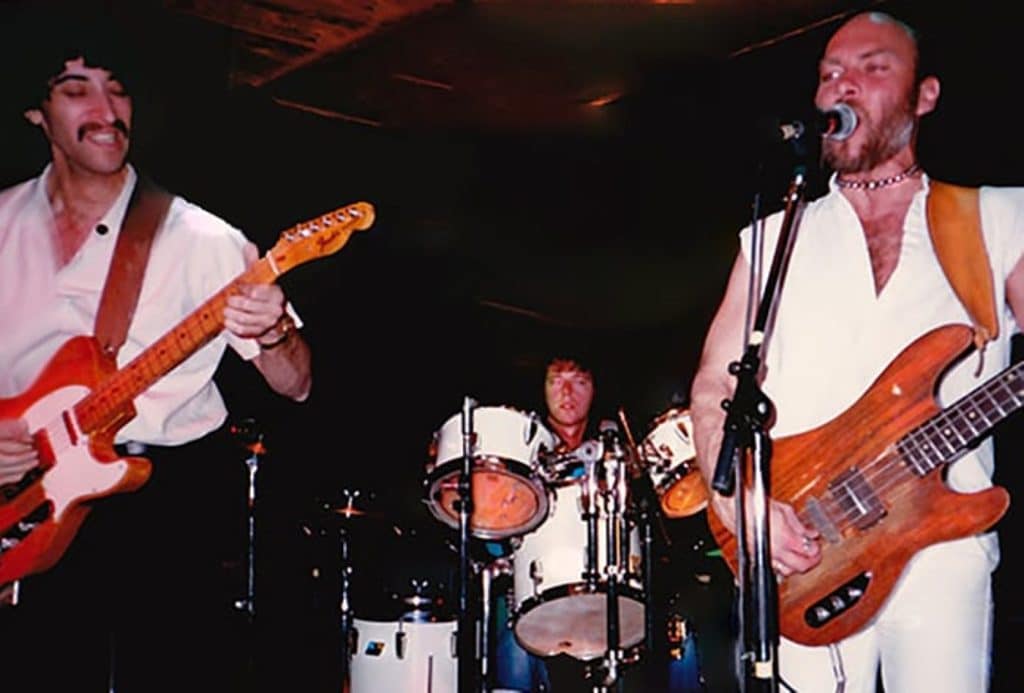“He had the chops to explain music to other musicians and to laypersons. No one else did what Dave did. He knew the way things worked because he had slugged away in the trenches just as he’d knocked on record company doors. He knew the lexicons, the currency, of each stakeholder. When he spoke in print, he spoke with authority.” Ottawa-based musician and writer T Bruce Wittet pays tribute to John Kelman, the much-liked and respected international music journalist…having also previously known him well under his real name, as Dave Binder, and as a live & session musician. In sadness.
T. Bruce Wittet writes: The celebration of the life of David Binder was a modest gathering held late in August, 2024 in his home town of Ottawa, Canada. I was startled to hear of his untimely passing in his late sixties.
He had left instructions to play a James Taylor song, ‘It’s Enough to be on Your Way’. When the deceased asks to speak to the living by means of a song, you want to listen carefully , give it your full attention. Alas, while the funeral home had claimed they had a sound system available that would be adequate, this was not the case. Virtually no one got a fair listen, which is why I’m repeating a selection from the lyrics here. It expresses a cycle of life and the nature of community
The sun shines on this funeral
Just the same as on a birth
The way it shines on everything
That happens here on earth.
It rolls across the western sky
And back into the sea
And spends the day’s last rays upon this fucked-up family
So long old pal…
My perceptions date back to 1971 and answering the door at our rehearsal space. Age differences are magnified when you’re in high school. I was 19 and I opened the door and there was Dave, three years my junior, and with a good grasp on a guitar case. He was nerdy with dark glasses, almost black hair, and he seemed barely out of short pants. He explained that he was the guy who had called about the “seeking guitarist” newspaper ad. He was bursting with enthusiasm so I led him immediately downstairs.
I introduced Dave and watched him warm up. He was consistent. He was powerful. I turned to him and whispered, “far as I’m concerned you’ve got the job”.
Once he learned a song, it was for keeps. His ability to recall songs, artists, cartoon characters, any detail from any Quentin Tarantino movie or Steven King book was impressive, as was his loyalty. He stayed with a band until the bitter end. Some say he was a born front man in the rich tradition of David Byrne and Elvis Costello. All I know is that he had his fans who followed behind him, gig to gig. When he moved on after our band expired, his fans went with them.
I felt Dave was a little clumsy on stage in a good way. He was no Mick Jagger. Dave and I both lacked grace. Rather than Arthur Murray, we adhered to the Joe Cocker School of Dance. To see Dave Binder move in giant steps, his guitar in front or in tow, was one take on the human condition. It seemed so gregarious it was not quite right. James Taylor mentioned such a state of physical being in the song ‘Copperline’: “One time I saw my daddy dance; he brought it back from the war in France.”
Dave was the polar opposite of the stereotypical rock musician.. He drank no alcohol, took no drugs. I never saw Dave Binder open a beer and consume it. Not alcohol, not coffee, not tea, nor mushrooms.
Meanwhile fusion hit the jazz market and set new heights for soloists like John McLaughlin and Jan Hammer. I thought that they played as if paid by the note. Dave thought it was exciting. I thought of fusion jazz as an injustice; more for recreation than for making music.
I can’t remember when I introduced Dave Binder to legendary folk artist Ian Tamblyn but they got on well. Soon I was cutting another album with Ian, this time with Dave on guitar. The album was an anomaly. Ian had discovered U2 before they made noises in Canada and Tamblyn’s album Dance Me Outside was dedicated to the Irish band. The track ‘White Belt, White Shoes’ referred to the post-disco dress code for gangsters who hung out in the upper rooms of clubs. ‘White Belt’ showed that Ian had been bitten by the British bug that brought me to the feet of Richard Thompson. It certainly had neither folk nor radio written all over. Dave’s parts in this song harken to Larry Carlton who cut ‘Don’t Take me Alive’ with Steely Dan.
In music you play yourself. And each project he undertook, Dave gave his all. When he came into the fold with Gerry Griffin, Dave was damn near obsessed. You can hear how he takes over the tracks, or at least was the perfect foil to Gerry, who had returned from a medieval prison in Melilla, Spanish Morocco, in North Africa. The entire album was written under barbaric conditions of squalor, corruption, punishment. The ensuing album interested Jeffrey Lesser who’d been involved with Kiss and one of the Lion King albums. Jeffrey was good for Gerry because he knew when to quit
I’ve chosen ‘Melilla’ and ‘I Hate Love’ to illustrate the level at which Dave was contributing. The lofty heights made his fall more traumatic, meaning the album bombed. He never recovered fully. It wasn’t anything obvious , frankly, but to me it was as plain as the nose on his face.
When I began complaining to Dave that he ought to be more active and join me in my new home studio it bothered him. The more I swooped down and pecked at him, the more he angered. He reminded me that my memory had lapsed. “Bruce, have you forgotten that it was largely due to your encouragement that I began to seriously investigate a career in music journalism?”
Guilty as charged. For almost a decade I edited a magazine out of Montreal, glossy, English and French. One issue I was short by a couple of newsy pieces the publisher wanted: to promote a friend and potential advertiser. The first was an exposé on a sports medical facility run by musicians in the name of musicians. The other piece was a puff piece about the pharmaceutical industry: are drugs the answer? Dave nailed both articles, understood the political ramifications, and kept the magazine running another month or six. But then for want of ads, the magazine I edited (we’re talking print media) was getting eaten alive. I told Dave that he was a special writer who, if he played his cards right—and consistently—might find himself running in a one-horse race. Music journalism has always had a problem. The question looms during any interview: is the interviewer a fan, a friend, or promotional agent? With Dave, now John Kelman, it was love of music. He had the chops to explain music to other musicians and to laypersons. No one else did what Dave did. He knew the way things worked because he had slugged away in the trenches just as he’d knocked on record company doors. He knew the lexicons, the currency, of each stakeholder. When he spoke in print, he spoke with authority.

If you’ll permit a parting anecdote, it is a humble tale about two friends perched in a second story window, one of them balancing a guitar and the other playing wire brushes on a tobacco tin: Dave and I. There had been anxious minutes—a real showdown—between the orchestra conductor and our quartet. On the eve of the debut of a symphony for orchestra and rock combo, we joined the rehearsal and played parts that sounded nothing like the printed page. You’ve rewritten the composer’s music? Would you do the same if it were Beethoven or Wagner? We thought we were doing them a favour. After tense negotiation we agreed to revert to the original. Give us this evening to review our parts and your wish is granted. A fist fight had been averted. Or worse.
We didn’t get into the fact that Dave Binder was the audacious one who trampled on one party’s intellectual property to assert his. This same Dave Binder was my musical companion and what happened next was, to me, miraculous. He’d bought Jethro Tull’s album Thick as a Brick on my recommendation. Whereas I’d listened to it all week solid, he was pushed against the wall dealing with this youth orchestra visit; thus, he’d scarcely had time to fit in two listens. Two are better than none. We talked briefly on the phone about covering one of the ‘movements’ within the long piece for our band to perform. But there in the window, Dave was taking his messages from another master. He surprised me. I recognized his opening chord and the tell tale salutation: “really don’t mind if you sit this one out”. Lead vocals, too! I signaled that I’d take the next line, “my word’s but a whisper, your deafness a shout”. We played the entire Thick as a Brick, start to finish, no omissions, no major hiccups, and every single chord, or reasonable substitution, was in its proper place. The vocals were sometimes off a little but sincere as the day is long. And as the sun dipped to the west we played Thick as a Brick in its entirety. No rehearsals, two listens by Dave. I was awestruck.
We had laughs a plenty, especially when the last note sustained and vanished. We did it! I still can’t get over it. Two listens. Deux-fois! Est ce-que c’est possible?! This Binder fellow: he must have had help, help from the beyond. If I had one criticism, it’s that while both of us could hit the notes and sound like vocalists, the drum and guitar parts might be compromised, and we could maybe call on – we’d gone through this before. We knew no vocalists we could count on! No problem, we’ll do the whole thing as a duet. But we’ll get in one full rehearsal!
This is the ear-to ear-smiles, and deep wholesome laughs, and naughty ones at junctures such as, “Let me make you a present of song, as your wise man breaks wind and is gone”. Fierce shrieking ensued. Next time I’ll find that old whoopy cushion. The thought of it brings out my not so inner child. At times like this, when there is something to be said or something to be sung, who will join me? Why do things have to go this way? The answer, said Irish singer-songwriter Paul Brady, is: nobody knows.
I miss Dave. I could have tried harder to stay close friends. Honestly, I’m glad he became such an acclaimed, revered writer. But our entire friendship was born of music and with music gone, removed from the equation, what remained had lost its raison d’être. Words were spoken that ought to have been withheld, at least the ones that dated back five decades.
You are the master of the unspoken word, my grandfather, my mentor, told me. Once spoken the word is master of you.
Now I get it.


